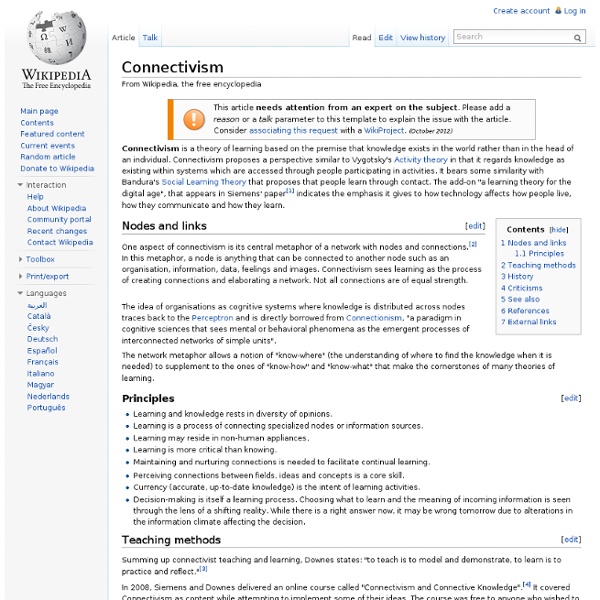Talk:Connectivism
wikipedia as a battlefield of views and beliefs?[edit] Of course everyone is entittled to a view on any subject.
The Virtual Choir: How We Did It – Blog – Eric Whitacre
In the 48 hours since we posted the Lux Aurumque Virtual Choir video soaringleap.com has seen an extraordinary number of new visitors. (Thank you to everyone who has taken an interest and linked here, especially mashable.com and Andrew Sullivan at The Daily Dish). I thought I would take this opportunity to welcome everyone, and give a brief explanation as to how the Virtual Choir came to be.
Nine Elements
Nine Themes of Digital Citizenship Digital citizenship can be defined as the norms of appropriate, responsible behavior with regard to technology use. 1. Digital Access: full electronic participation in society. Technology users need to be aware that not everyone has the same opportunities when it comes to technology. Working toward equal digital rights and supporting electronic access is the starting point of Digital Citizenship.
Are the Basics of Instructional Design Changing? ~ Stephen's Web ~ by Stephen Downes
Joseph Beckmann wrote: Philosophy is a much larger, much deeper and much more complex activity than "constructivism" could ever encompass. It involves a worldview that is so much more a challenge than neurology's current state that Paul Allen's billion dollar investment in pure research on brain activity suggests we hold off on any of these labels for, oh, a century or so. This comment is well taken, in my opinion.
Connectivism and its Critics: What Connectivism Is Not
Posted to the CCK08 Blog, September 10, 2008. There are some arguments that argue, essentially, that the model we are demonstrating here would not work in a traditional academic environment. - Lemire - Fitzpatrick - Kashdan These arguments, it seems to me, are circular.
Thomas L. Friedman
History of the world twenty years from now, and they come to the chapter "Y2K to March 2004," what will they say was the most crucial development? The attacks on the World Trade Center on 9/11 and the Iraq war? Or the convergence of technology and events that allowed India, China, and so many other countries to become part of the global supply chain for services and manufacturing, creating an explosion of wealth in the middle classes of the world's two biggest nations, giving them a huge new stake in the success of globalization?
Instructional design is dead
Let me start by saying that for many, many years, my title was some variation of "Instructional Designer." And so, its with some amount of hesitance that I say that the field of instructional design is, well, crap. I'm not a traditional instructional designer, having a Master's degree in education instead of instructional design or instructional technology. I somehow backed my way into instructional design, working in a whole department of instructional designers in my first ID job.
About — Connectivism
Description of Connectivism Connectivism is a learning theory for the digital age. Learning has changed over the last several decades. The theories of behaviourism, cognitivism, and constructivism provide an effect view of learning in many environments. They fall short, however, when learning moves into informal, networked, technology-enabled arena. Some principles of connectivism:
Distance education
Distance education, distance learning, dlearning, or D-Learning is a mode of delivering education and instruction, often on an individual basis, to students who are not physically present in a traditional setting such as a classroom. Distance learning provides "access to learning when the source of information and the learners are separated by time and distance, or both.
Massive open online course
Poster, entitled "MOOC, every letter is negotiable," exploring the meaning of the words "Massive Open Online Course" A Massive Open Online Course (MOOC; /muːk/) is an online course aimed at unlimited participation and open access via the web. In addition to traditional course materials such as videos, readings, and problem sets, MOOCs provide interactive user forums that help build a community for students, professors, and teaching assistants (TAs). MOOCs are a recent development in distance education.[1] Although early MOOCs often emphasized open access features, such as connectivism and open licensing of content, structure, and learning goals, to promote the reuse and remixing of resources, some notable newer MOOCs use closed licenses for their course materials, while maintaining free access for students.[2][3][4]
Florida Virtual School
What is FLVS? We're glad you asked! Florida Virtual School is a public school but, as you can probably tell, we're not just any public school. We're online. This means no matter where you live you can access more than 120 courses, from Geometry to AP Art History and everything in between.
JOLT - Journal of Online Learning and Teaching
Introduction The proliferation of learning/course management systems (L/CMS) over the past decade has occurred in multiple sectors: K-12, higher education, government and the business workplace. Distributed learning systems originated within a Fordist framework (uniform, mass produced and delivered) and transitioned to a neo-Fordist model in the late 20th century with more customization and innovation (Edwards, 1995). System design and delivery mechanisms have been historically unique across sectors, targeting a specific audience.



